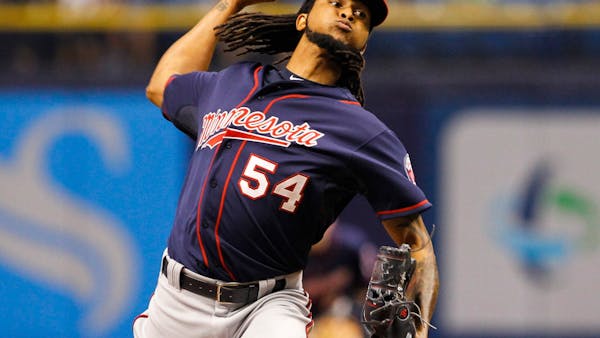Miguel Sano is a lot of things already, after only 45 major league games. He's the Twins' most dangerous hitter (we could argue this, but his approach, power and the way he's pitched indicate it's true). He's a middle-of-the-order savior. He's everything advertised and more.
But prompted by a tweet from Judd Zulgad last night indicating he thinks Sano is the choice for AL Rookie of the Year if the Twins make the postseason, I had to take a closer look at whether Sano is really a prime contender for that award.
First, the good: Sano is mashing. Of MLB rookies with at least 150 plate appearances this season, he's first in OPS and slugging percentage. He has 12 homers — five of them on this road trip, trying his best to keep the Twins in the race. By sheer production alone, even in a small sample size, he's making himself a factor.
Now, the bad news: there are a few pretty big obstacles in Sano's way when it comes to the Rookie of the Year race.
The first: Carlos Correa, the shortstop for the Astros who fans will have the pleasure to see at Target Field this weekend, has been phenomenal since being called up two months into the season. Correa is hitting for power and average while playing highlight-reel defense. He also has 100 more at-bats than Sano. As long as Correa doesn't fall apart, he has to be considered the odds-on favorite to win the award with the Astros.
The second, somewhat related to the first: In contrast to Correa and other candidates, Sano has done most of his work as a one-dimensional designated hitter force. If there's an offensive tie between Sano and another candidate, this could be the tiebreaker.
The third: Sano has played 45 games, and the Twins have only 37 remaining. So he can play a maximum of 82 games this season, and considering he has 189 plate appearances now we can expect him to finish around 340 plate appearances. In the history of the Rookie of the Year Award, which dates back to Jackie Robinson in 1947, only one offensive winner has claimed the honor while playing in 82 games or fewer (Willie McCovey, with a scant 52 red-hot games in 1959. Only three other offensive players have won the award while playing in fewer than 100 games.
Perhaps the bright side within that is that two of those players — Wil Myers in 2013 and Ryan Howard in 2005 — came within the past decade, and both played in 88 games while finishing with only a slightly higher number of plate appearances than Sano projects to get.
Howard's monster rookie batting average/on-base/slugging slash line of .288/.356/.567 was enough to overcome his lack of at-bats; Sano's surge lately gives him an even more robust .287/.397/.592 slash line. So it is possible. But it is rare.
Long story short: the award is Correa's to lose thanks to his marvelous two-way play and head start on Sano while playing for an even better surprise winning team. But a big final push from Sano would at least make things interesting in spite of his late start, particularly if his bat carried the Twins into the postseason.
What's interesting is that two of Sano's teammates — Eddie Rosario and Trevor May, who is technically (barely) still a rookie — should also get some votes. That's a good sign for the Twins.
In heated western Minn. GOP congressional primary, outsiders challenging incumbent

Minnesota Sports Hall of Fame: A class-by-class list of all members

This retired journalist changed professional wrestling from Mankato

